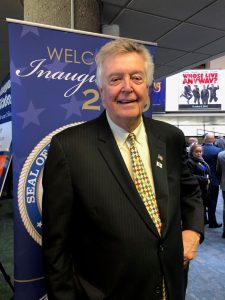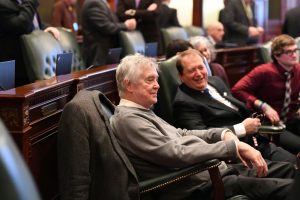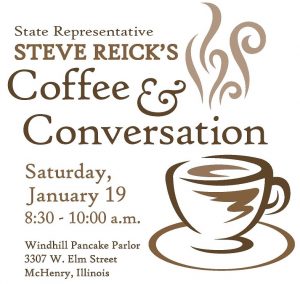Rep. Reick Appointed to Serve on Bipartisan Joint Committee on Administrative Rules
During the afternoon of Inauguration Day, House Republican Leader Jim Durkin announced my appointment to the Joint Committee on Administrative Rules (JCAR), a bi-partisan, bi-cameral legislative oversight committee. I will serve alongside House Republicans Keith Wheeler (R-Oswego) and Tom Demmer (R-Dixon) on the 12-member, bipartisan ad bicameral committee.
State government regulations impact every aspect of the lives of Illinoisans, so it’s an honor to be selected to serve on this important oversight committee. We need to ensure that our regulatory environment in Illinois helps small businesses create jobs and reduces government burdens on working families. I appreciate Leader Durkin’s faith in my ability to contribute to this important work, and I look forward to this new role.
The members of JCAR oversee the rule-making process by state agencies, making sure the rules abide by the original intent of legislators when laws are passed. The committee is composed of 12 legislators who are appointed by the legislative leadership, with the membership apportioned equally between the two houses and the two political parties. It is co-chaired by two members representing each party and each legislative house. The members of JCAR are also charged with making sure the General Assembly is adequately informed of how laws are implemented through agency rulemaking and facilitating a public understanding of rules and regulations.
Rep. Steve Reick Launches Coffee & Conversation Tour
The Coffee & Conversation events will compliment an already-existing mobile office hours tour that brings district office resources to local libraries throughout the 63rd District.
Governor Vetoes Township Consolidation Bill that Targeted McHenry County
On Friday afternoon, Governor Bruce Rauner issued an amendatory veto to HB 4637, which singled out McHenry County and would have allowed township consolidation referenda to be brought forward by an extremely small number of township residents and without a cost study to prove savings. I was a vocal opponent to this bill throughout the legislative process. Upon learning of the Governor’s veto, I issued the following press statement:
“I am pleased with this amendatory veto and agree with the Governor’s comments that consolidation legislation of this nature should not target just one county. When I spoke against this bill during the House floor debate, I expressed my opposition to this ‘McHenry County-only’ initiative. The sponsor of this bill, in my opinion, was capitalizing on political dysfunction within one McHenry County Township. I believe the bill was written to only apply to one county because he would not have been able to generate the required number of votes if lawmakers were being asked to vote for the provisions in their own districts.
“There was nearly unanimous opposition to this bill by the members of the McHenry County Board, which would have had to absorb township functions through this consolidation bill. I am pleased to know the Governor put the brakes on this legislation so that a future bill could be written in a much more thoughtful and comprehensive fashion.
“My primary concern with consolidation legislation remains the absence of a requirement for an independent cost study to prove cost savings will truly occur. I maintain that consolidation for the sake of consolidation is not always beneficial to taxpayers. Show us your study and prove your savings. Then you can take you case to the voters.”
December Revenues Up Modestly
During the first part of Fiscal Year 2019, the fiscal year that began on July 1, 2018, revenues increased and Illinois was able to begin to chip away at the more than $7 billion in unpaid bills that burden Illinois health care providers and other creditors. This revenue growth curve flattened in December 2018 as existing taxes ceased to yield major net new revenue. Personal income tax payments to the State in December 2018, $1,577 million, exceeded the year-earlier figure by only $7 million, an annual growth rate of 0.4%. The flattened growth curve indicates the consequences of the failure of Illinois’ economy to generate a significant number of net new jobs. While other states such as Florida and Texas are creating large numbers of new jobs, Illinois is not doing so.
These and other revenue numbers can be found in the monthly report generated for December 2018 by the Commission on Government Forecasting and Accountability (CGFA), the General Assembly’s nonpartisan budget monitoring office. CGFA was able to track significant growth in several smaller revenue lines. Sales tax revenues rose by $60 million in December 2018 relative to one year earlier, buoyed by Christmas sales and the newly-granted ability of the State to impose sales taxes on many purchases made online. Income from federal sources, which includes matching grants made by Washington to Illinois for payment to Medicaid care providers and other contractors, rose by $89 million. Current news events in Washington raise questions about whether this healthy increase can be sustained in January 2019. The Illinois General Assembly, working though the professionals at CGFA, will have to closely monitor revenue trends in the second half of FY19 in order to begin the work of putting together a new budget for FY20. This will be among the legislature’s top priorities in the 2019 spring session.
Illinois Underground Natural Gas Storage Safety Act becomes Law
A new law, SB 3549, sharply increases regulatory controls over underground aquifers and nearby geological strata used to store natural gas. The storage facilities serve as gigantic batteries that can be used to generate electricity on demand. A sharp movement in Illinois power generation, from coal-fired electricity to power generated from natural gas, has led to the construction and expansion of these facilities within state lines.
Under the bill, signed into law as P.A. 100-1172, the Illinois Department of Natural Resources (which regulates underground caves and mines) and the Illinois Commerce Commission (which regulates electricity and gas) will work with the U.S. Department of Transportation to ensure that all underground gas storage facilities in Illinois meet federal minimum safety standards. This will help protect aquifers and sources of groundwater used by hundreds of thousands of Illinoisans. The new measure was signed into law on Friday, January 4.
Old 100th General Assembly Convenes for Final Days of Session Activity; Passes Tollway Bill
The “lame-duck” session met earlier this week prior to the inauguration of the new 101st General Assembly. The House passed a bill to create a changeover in the membership of the Illinois Toll Highway Authority, the often-controversial board with executive responsibility over the toll roads of northern Illinois. SB 1298 will end the terms of the nine members of the Toll Highway Authority, allowing the new Governor J.B. Pritzker to make appointments to fill the vacancies.
The new Tollway Board could take steps to reduce the level of patronage hiring and contracting associated with the operations of the Authority. A newspaper investigation has uncovered cases of contracts being awarded to firms linked with Toll Highway executives. It is expected that some, but not all, of the members of the departing board could be reappointed. No more than five of the nine members may be from either political party.



